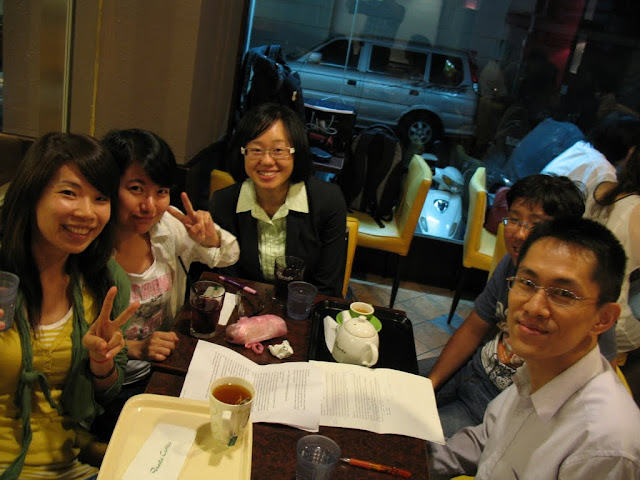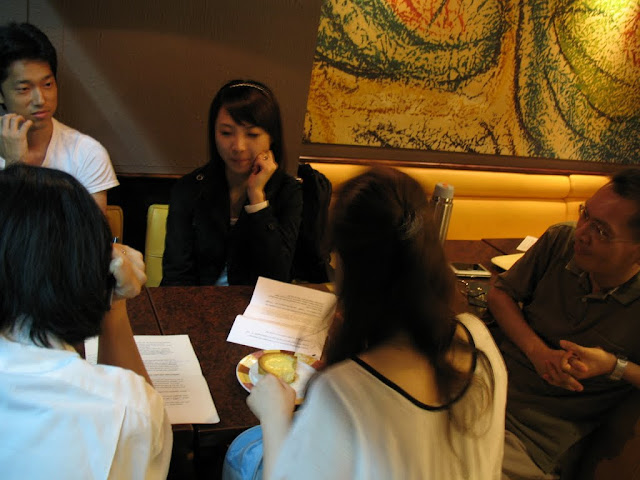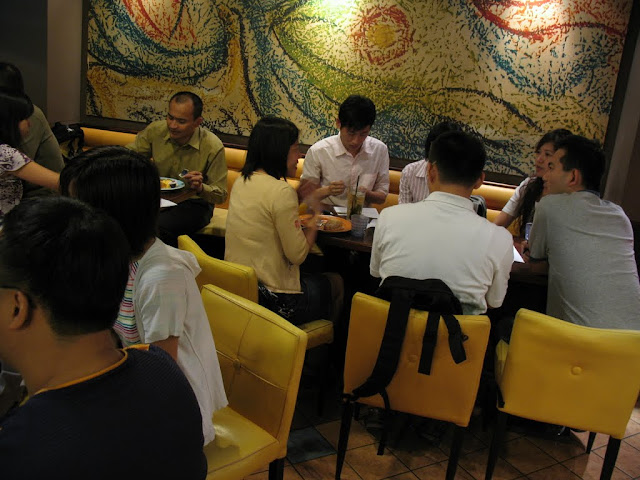Hi, this is Janet again. I am honored to be the host for next Monday and Wednesday's meeting. This time I think we can have a debate about some controversial issues. Hope you will enjoy the meetings.
“The law, in its majestic equality,” wrote the 19th-century novelist Anatole France, “forbids the rich as well as the poor to sleep under bridges, to beg in the streets and to steal bread.”
If crushed bodies were the enduring images of Haiti’s earthquake, the most memorable ones of Chile’s have been of looting. Because of stricter building codes, far more people survived in middle-class Chile than in impoverished Haiti.
Nonetheless, a pattern that now is a cliché of disaster journalism broke out there as well: Early reports of people raiding markets for food and diapers were quickly followed by pictures of people carrying TVs and dishwashers off into a city with no electricity. Intact stores were broken into. A department store in Concepción was set ablaze. In a few places, roving bands robbed anyone they could. Residents who formed self-defense posses were quoted saying that the “human earthquake” was worse than the geological one.
Which raises the questions: When are desperate people entitled to help themselves? And to what? At what chaotic point between the diapers and the dishwasher may the police shout, “Drop that (insert morally ambiguous item here) or I’ll shoot?”
By midweek, with thousands of troops deployed, the pictures began shifting: young men spread-eagled on the ground with gun muzzles pressed behind their ears.
All in all, it sounded a lot like Haiti. Or like New Orleans after Hurricane Katrina. Or like Dayton, Ohio, after the 1913 flood. Or like Rome in 410.
It is hard to name a single disruption in the social order, natural or man-made, that has not triggered looting somewhere. Thick snow? Chicagoans looted in a record blizzard in 1967. Montreal residents looted during a 1969 police strike. In 1911, Sicilians dodged lava flowing out of Mount Etna to loot homes abandoned in its path. And don’t forget the sacking of the National Museum in Baghdad, in the wake of invasion in 2003.
But it is also hard to predict when looting will erupt, and when it won’t. New York’s 1965 blackout was famous for the citywide bonhomie it produced. But July 1977 was different: When the lights went out then, if one lived in Greenwich Village it felt like the big block party was back; but in poor black and Hispanic neighborhoods, hundreds of stores were looted and 25 fires still burned the next morning.
Though looting starts spontaneously, how quickly it stops appears to depend on how rapid and severe a response it meets. That, in brief, is the argument for using force decisively.
The worst rampage in New York’s history was started not by a natural disaster, but by draft numbers being drawn. In 1863, poor laborers, most of them Irish, rebelled against conscription for the Civil War; the all-Irish “Fighting 69th” had just been virtually wiped out at Gettysburg.
The mobs lynched blacks and torched a black orphanage, attacked the mansions of anti-slavery Republicans and burned the mayor’s home. Most of the state militia was still in Pennsylvania, so it was days before Federal troops intervened in force, using artillery to disperse the mobs.
By contrast, in San Francisco in 1906, the earthquake struck at 5:13 a.m. In the Presidio, making decisions in a vacuum because telegraph and telephone lines were down, Brig. Gen. Frederick Funston ordered troops to march to the Hall of Justice and report to Mayor Eugene E. Schmitz. The first detachment arrived at 7 a.m., and by 3 p.m., Mayor Schmitz had officially authorized the troops “to kill any and all persons engaged in looting or in the commission of any other crime.”
“Let it be given out that three men have already been shot down without mercy,” he told reporters.
Historians disagree about how many were actually killed. Some witnesses claimed a few people trapped on the roofs of burning buildings or under flaming rubble were also shot — with their permission — to save them pain. In any case, looting was relatively minor, cavalrymen herded crowds away from huge fires, and the military was praised for the tent cities it hastily erected in the city’s parks.
Legally, as Anatole France observed, the starving may not filch even bread. But academics who study looting parse it into three separate rungs on a ladder of moral ambiguity.
Stealing food to survive is accepted by most.
Stealing TVs slides into a grey area. Yes, a starving man could sell a TV for food, but it’s never clear his motives are that pure.
And the third level — rampage and mayhem that is really ethnic or class warfare or the Hobbesian “war of all against all” — is universally condemned, even though many say the poor of every country have a right to be angry and ought to be forgiven for showing it during a crisis.
Tricia Wachtendorf, associate director of the University of Delaware’s Disaster Research Center, objects to even the use of the words “looting” or “crime” to describe taking essential goods, noting that nobody objected to firemen taking water from stores near Ground Zero to rinse the World Trade Center’s smoke from their eyes.
The ethics depend on the facts of each case, said James M. Glass, a politics professor at the University of Maryland. “You can argue that hungry men stealing from stores is O.K., but hungry men attacking a woman with a bag of groceries for her kids is a moral quagmire. It’s not a situation where anybody comes out in a good way.”
Source: http://city.udn.com/50132/3912894?tpno=4&cate_no=0
Questions for Discussion:
Session One:
1.Do you agree people can steal food to survive during the war? Or do you think stealing will cause more chaos? Why?
2.Think up one thing that is controversial to you, tell us its pro and con. If you had the power to eliminate it, will you do it? Why?(For example, vehicles are extremely convenient to travel around. It can take us to the other side of the Earth in just few hours. It also elevates human culture and economy in some ways. On the contrary, it brings war, pollution and accident as well. )
3.What do you think is a major decision you made that have changed your life? How did it turn out? Would you make a different decision if you had a second chance?
Session Two:
Please try to have a debate on the following questions. Each one have to answer them and use your previous related experience to support your answer. After everyone finishes answering the questions, the other members can challenge you by their observation on you in life for two minutes. Then you can have another debate for yourself for another two minutes.
1. If it was raining outside but you forgot to bring your umbrella, would you take other people's umbrella?
2.You and your girlfriend (boyfriend) went to see a movie together. But you wanted to see “Avatar” and she (he) wanted to see “Twilight”? What would you do?
3.If you used to be a famous actor (actress), but now you were old and poor, some diaper company wanted you to star in a adult diaper commercial, would you do it? Why or why not?
----------------------------------------------------------------------------------------------------------------------------------------------------------
Agenda:
6:45 ~ 7:00pm Greetings and free talk among members and guests /taking individual orders/getting newcomers' information
7:00 ~ 7:10pm Opening remarks/ Newcomers self-introduction/ Grouping
(Session I)
7:10 ~ 7:50pm discussion session (40 mins)
7:50 ~ 8:10pm summarization (20 mins)
8:10 ~ 8:15pm Regrouping & instruction giving
(Session II)
8:15 ~ 8:25pm Taking a 10 minutes break (Intermission)
8:25 ~ 9:05pm discussion session (40 mins)
9:05 ~ 9:25pm summarization (20 mins)
9:25 ~ 9:30pm Concluding remarks/feedback from newcomers/ announcements ********************************************************************************************************************************************
聚會日期:列於該貼文主題內
聚會時間:當天請準時於 6:45 pm 到達 ~ 約 9:30 pm 左右結束
星期一聚會地點:丹堤濟南店
地址、電話:台北市濟南路三段25號 地圖 (02) 2740-2350
捷運站:板南線 忠孝新生站 3 號出口
走法:出忠孝新生站 3 號出口後,沿著巷子(忠孝東路三段10巷)走約 2 分鐘,到了濟南路口,左轉走約 2 分鐘即可看到。
最低消費: 50 元
聚會日期:列於該貼文主題內
聚會時間:當天請準時於 6:45 pm 到達 ~ 約 9:30 pm 左右結束
星期三聚會地點:丹堤復興長春店
地址、電話:台北市復興北路183號 地圖 (02)8712-9581
捷運站:木柵線 南京東路站
走法:出捷運南京東路站後,順著復興北路往北走約 3 分鐘,過了長春路與復興北路交叉口之後即可看到。
最低消費: 50 元
星期三的福利:點餐時請記得跟店員說,你是來參加 YOYO 聚會的,可以享有小杯飲料自動升級為大杯之權益!
注意事項:
1. 文章是否需要列印請自行斟酌,但與會者請務必自行列印 Questions for discussion。
2. 與會者請先閱讀過文章,並仔細想過所有的問題,謝謝合作!
給新朋友的話:
1. 請事先準備 2~3 分鐘的英語自我介紹;會議結束前可能會請你發表 1~2 分鐘的感想。
2. 請事先閱讀文章以及主持人所提的討論問題,並事先寫下自己所欲發表意見的英文。
3. 全程以英語進行,參加者應具備中等英語會話能力,對任一討論問題,能夠以 5 到 10 句英文表達個人見解。
4. 在正式加入之前,可以先來觀摩三次,觀摩者亦須參與討論。
5/24 & 5/26 Weighing the Morality of Looting In a Crisis
- wenhan1122
- Vice President
- 文章: 175
- 註冊時間: 週三 8月 20, 2008 3:29 pm
Re: 5/24 & 5/26 Weighing the Morality of Looting In a Crisis
This research sadly reminds me how fragile the humanity is. Most of us consider ourselves the righteous, educated and decent people. However, the research showed, most of us, may not be so.
http://www.euronews.net/2010/03/17/elec ... searchers/
http://news.sina.com.tw/article/20100318/2890423.html
A movie "The Wave" also shocked me by discussing if there is a possibility for the dictatorship political system existing in today's democratic countries. The true story shows, by suitable circumstances, it's possible to cultivate such an extreme system even we swear we all have learnt the tragedies incurred in Nazi Germany.
http://www.euronews.net/2010/03/17/elec ... searchers/
http://news.sina.com.tw/article/20100318/2890423.html
A movie "The Wave" also shocked me by discussing if there is a possibility for the dictatorship political system existing in today's democratic countries. The true story shows, by suitable circumstances, it's possible to cultivate such an extreme system even we swear we all have learnt the tragedies incurred in Nazi Germany.
The real peace is not merely the absence of warfare, but the presence of justice
- wenhan1122
- Vice President
- 文章: 175
- 註冊時間: 週三 8月 20, 2008 3:29 pm
Re: 5/24 & 5/26 Weighing the Morality of Looting In a Crisis
Meeting on May 24th.
Host: Janet
Attendants: Iverson, Cindy, Toshi, Molly, Jackson, Mountain, Wenhan, Tammy, Jessie, Yi-hao, Timothy, Vita, Debby, Masashi, Adams, Eddie, Christine, Christine Wang
New Comers: Sabrina Tu, Annie Yeh, Nancy Lin
Total: 22



Host: Janet
Attendants: Iverson, Cindy, Toshi, Molly, Jackson, Mountain, Wenhan, Tammy, Jessie, Yi-hao, Timothy, Vita, Debby, Masashi, Adams, Eddie, Christine, Christine Wang
New Comers: Sabrina Tu, Annie Yeh, Nancy Lin
Total: 22
The real peace is not merely the absence of warfare, but the presence of justice
